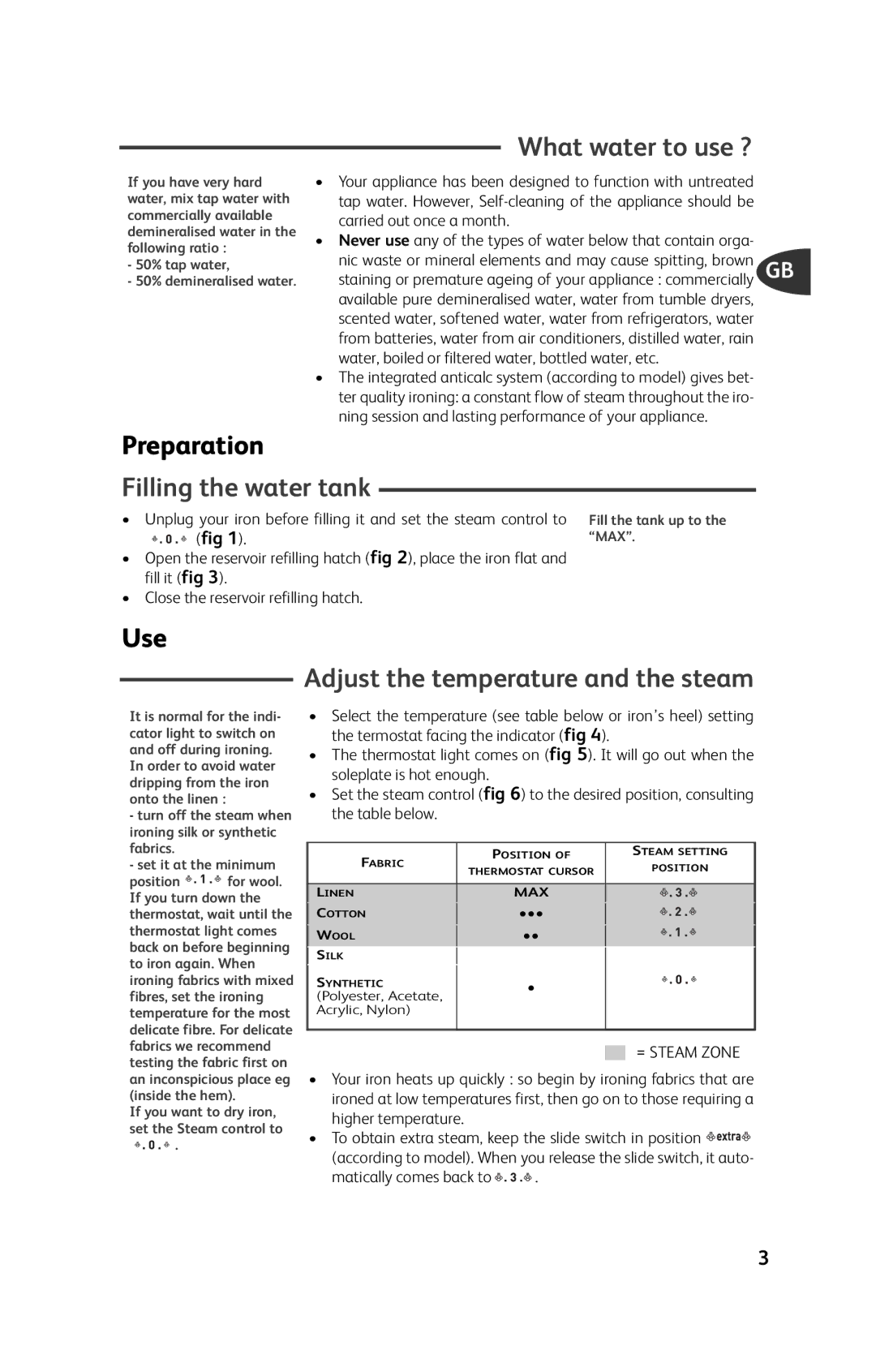
If you have very hard water, mix tap water with commercially available demineralised water in the following ratio :
-50% tap water,
-50% demineralised water.
What water to use ?
•Your appliance has been designed to function with untreated tap water. However,
•Never use any of the types of water below that contain orga-
nic waste or mineral elements and may cause spitting, brown staining or premature ageing of your appliance : commercially GB available pure demineralised water, water from tumble dryers, scented water, softened water, water from refrigerators, water from batteries, water from air conditioners, distilled water, rain water, boiled or filtered water, bottled water, etc.
•The integrated anticalc system (according to model) gives bet- ter quality ironing: a constant flow of steam throughout the iro- ning session and lasting performance of your appliance.
Preparation
Filling the water tank
•Unplug your iron before filling it and set the steam control to
![]()
![]()
![]() (fig 1).
(fig 1).
•Open the reservoir refilling hatch (fig 2), place the iron flat and fill it (fig 3).
•Close the reservoir refilling hatch.
Fill the tank up to the “MAX”.
Use
Adjust the temperature and the steam
It is normal for the indi- cator light to switch on and off during ironing. In order to avoid water dripping from the iron onto the linen :
-turn off the steam when ironing silk or synthetic fabrics.
-set it at the minimum
position ![]()
![]()
![]() for wool. If you turn down the thermostat, wait until the thermostat light comes back on before beginning to iron again. When ironing fabrics with mixed fibres, set the ironing temperature for the most delicate fibre. For delicate fabrics we recommend testing the fabric first on an inconspicious place eg (inside the hem).
for wool. If you turn down the thermostat, wait until the thermostat light comes back on before beginning to iron again. When ironing fabrics with mixed fibres, set the ironing temperature for the most delicate fibre. For delicate fabrics we recommend testing the fabric first on an inconspicious place eg (inside the hem).
If you want to dry iron, set the Steam control to ![]()
![]()
![]() .
.
•Select the temperature (see table below or iron’s heel) setting the termostat facing the indicator (fig 4).
•The thermostat light comes on (fig 5). It will go out when the soleplate is hot enough.
•Set the steam control (fig 6) to the desired position, consulting the table below.
FABRIC | POSITION OF | STEAM SETTING | |
THERMOSTAT CURSOR | POSITION | ||
| |||
|
| ||
|
|
| |
LINEN | MAX |
| |
COTTON | ••• |
| |
| |||
WOOL | •• |
| |
| |||
SILK |
|
| |
SYNTHETIC | • |
| |
(Polyester, Acetate, |
|
| |
Acrylic, Nylon) |
|
| |
|
|
|
 = STEAM ZONE
= STEAM ZONE
•Your iron heats up quickly : so begin by ironing fabrics that are ironed at low temperatures first, then go on to those requiring a higher temperature.
•To obtain extra steam, keep the slide switch in position ![]()
![]()
![]()
![]()
![]()
![]()
![]() (according to model). When you release the slide switch, it auto- matically comes back to
(according to model). When you release the slide switch, it auto- matically comes back to ![]()
![]()
![]() .
.
3
